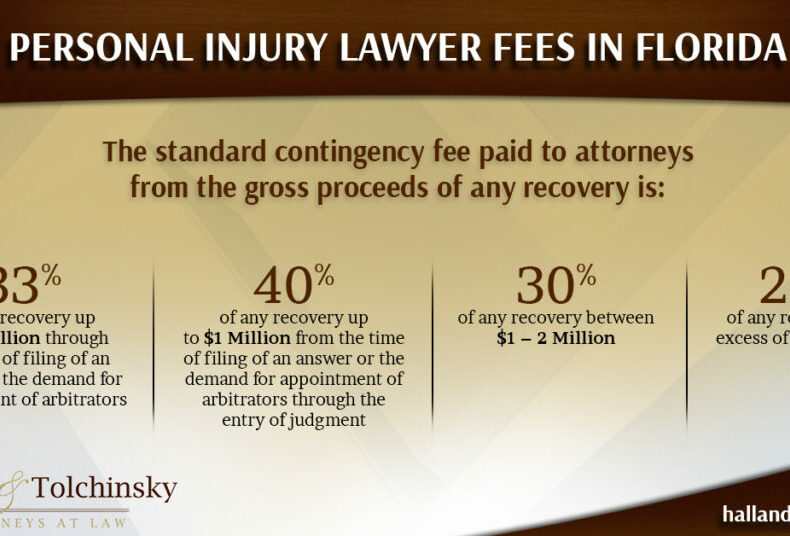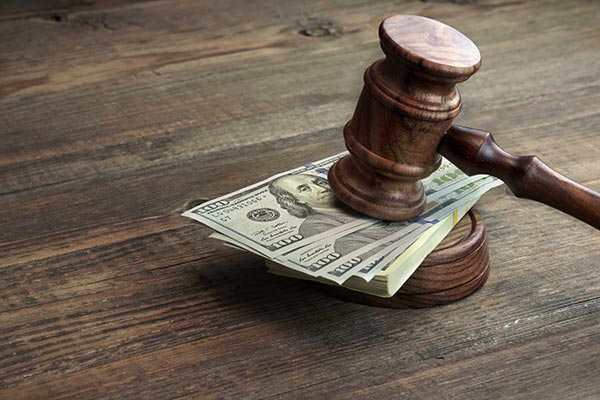
standard lawyer fee for personal injury
Understanding the standard lawyer fee for personal injury cases can be confusing. It’s important to know what to expect before hiring a lawyer.
When dealing with a personal injury claim, knowing the typical costs involved is crucial. Most personal injury lawyers work on a contingency fee basis. This means they only get paid if you win your case. The standard fee often ranges from 25% to 40% of the settlement amount.
This percentage can vary based on factors like case complexity and lawyer experience. Understanding these fees helps you make informed decisions and avoid surprises. Let’s dive into the details of what you should expect.
Introduction To Lawyer Fees
Understanding lawyer fees is essential before hiring a personal injury attorney. These fees can vary widely based on several factors. Knowing the basics helps you make informed decisions. In this post, we will break down the fee structures to make it easy to understand.
Basics Of Legal Fees
Legal fees are the charges lawyers ask for their services. These fees can be hourly, flat, or contingency based.
- Hourly Fees: Lawyers charge a set amount per hour.
- Flat Fees: A fixed amount for specific tasks.
- Contingency Fees: Payment only if you win the case.
Each fee type has its advantages. For personal injury cases, contingency fees are common. This means you pay only if you get compensation.
Importance Of Fee Structures
Knowing the fee structure helps you avoid surprises. It also helps you budget for legal expenses.
| Fee Type | Description | Common Use |
|---|---|---|
| Hourly Fees | Charges per hour of work. | General legal advice. |
| Flat Fees | Fixed charge for a task. | Simple legal tasks. |
| Contingency Fees | Payment only if you win. | Personal injury cases. |
Understanding these structures ensures you are prepared. It also allows you to ask the right questions.
Types Of Fee Arrangements
Personal injury lawyers offer different fee arrangements. These arrangements can help you understand how much you might pay for legal services. The main types of fee arrangements include contingency fees, hourly rates, and flat fees.
Contingency Fees
Many personal injury lawyers work on a contingency fee basis. This means they only get paid if you win your case. Usually, the lawyer takes a percentage of the settlement or award. This percentage can range from 25% to 40%. Contingency fees are common in personal injury cases. They allow clients to pursue justice without upfront costs.
Hourly Rates
Some lawyers charge by the hour. This means you pay for each hour the lawyer works on your case. Hourly rates can vary widely. They depend on the lawyer’s experience and location. You might also have to pay for other costs. These can include court fees, expert witnesses, and more. Hourly rates can be expensive. It’s important to get an estimate of the total cost before hiring a lawyer.
Flat Fees
Flat fees are another option. In this arrangement, you pay a set amount for the lawyer’s services. This fee covers the entire case, no matter how much time the lawyer spends. Flat fees are less common in personal injury cases. They are more common in simpler legal matters. But some lawyers might offer flat fees for certain types of personal injury cases. This arrangement can provide clarity on the total cost from the start.
Contingency Fee Breakdown
Understanding the cost of hiring a personal injury lawyer can be confusing. Most personal injury lawyers work on a contingency fee basis. This means they get paid only if they win the case. Let’s break down what this entails.
Percentage Rates
Lawyers typically charge a percentage of the settlement or award. This percentage is the contingency fee. It usually ranges from 25% to 40%. The exact percentage depends on various factors. These include the complexity of the case and the stage at which it is resolved. For example, a straightforward case settled out of court might incur a lower percentage.
Typical Ranges
Below is a table illustrating typical contingency fee ranges:
| Case Outcome | Contingency Fee Percentage |
|---|---|
| Settled Before Trial | 25% – 33% |
| Settled During Trial | 33% – 40% |
| Won at Trial | 40%+ |
In some cases, the fee may go higher. This usually happens if the case is very complex or goes to trial. Always discuss the fee structure with your lawyer upfront.
Success-based Payment
The contingency fee model is success-based. This means the lawyer gets paid only if you win the case. This model benefits clients who may not have the funds to pay a lawyer upfront. It also motivates the lawyer to work hard on your case. The lawyer’s payment depends on securing a favorable outcome for you.
This arrangement ensures that your interests align with those of your lawyer. Both parties aim for the highest possible settlement or award.

Credit: attorneybrianwhite.com
Factors Affecting Lawyer Fees
Understanding the factors affecting lawyer fees in personal injury cases is important. Lawyer fees can vary significantly. Several factors determine the final cost. Knowing these factors can help you make informed decisions.
Case Complexity
Cases with higher complexity often result in higher lawyer fees. Complex cases need more time and resources. They involve more research, paperwork, and negotiation. Lawyers may also need to hire experts, increasing costs. Simple cases are less expensive because they need less effort.
Experience Level
Lawyers with more experience charge higher fees. They bring valuable expertise and a track record of success. Experienced lawyers can navigate complex cases more efficiently. Newer lawyers may charge less, but their experience is limited. Choose a lawyer based on your case needs and budget.
Geographic Location
Geographic location plays a significant role in lawyer fees. Lawyers in big cities charge more than those in smaller towns. The cost of living and office expenses are higher in urban areas. Local demand for legal services also impacts fees. Consider location when choosing a lawyer for your case.
Negotiating Fees With Your Lawyer
Negotiating fees with your lawyer can save you money. Understanding how legal fees work helps you make informed decisions. Many people feel unsure about discussing money. Knowing what to expect makes the process smoother.
Initial Consultation
Most lawyers offer a free initial consultation. This meeting helps you understand your case and the lawyer’s fees. Be prepared with questions about costs. Ask if the lawyer charges by the hour or a flat fee.
Some lawyers work on a contingency basis. This means they only get paid if you win. Understanding these details is crucial before hiring a lawyer.
Fee Agreement
Once you decide to hire a lawyer, you must sign a fee agreement. This document outlines the cost of their services. Read it carefully. Make sure you understand all terms. Ask for clarification if needed.
A clear fee agreement prevents misunderstandings. It ensures both parties know what to expect. This transparency helps build trust.
Payment Plans
Legal fees can add up quickly. Some lawyers offer payment plans. These plans help you manage costs over time. Discuss this option with your lawyer. It can make legal services more affordable.
Payment plans vary. Some require monthly payments. Others may have different terms. Understanding the options can ease financial stress.
Additional Costs And Expenses
Personal injury cases often come with many expenses beyond the standard lawyer fee. These additional costs can add up quickly. It’s essential to understand these expenses to avoid surprises. Let’s explore some of the common costs and expenses.
Court Filing Fees
Filing a lawsuit involves paying court fees. These fees vary by jurisdiction. They can range from a few hundred to several thousand dollars. Court filing fees cover the cost of processing your case. They are non-refundable, regardless of the outcome.
Expert Witness Fees
Expert witnesses play a crucial role in personal injury cases. Their testimony can make or break your case. Experts charge for their time and expertise. Fees can run into thousands of dollars. This cost often includes preparation, deposition, and courtroom appearances.
Administrative Costs
Administrative costs cover various expenses. These include copying documents, mailing fees, and travel expenses. They might seem minor but can add up over time. Your lawyer might bill these costs separately.
Understanding Fee Agreements
Understanding fee agreements in personal injury cases is crucial. It helps clients know what to expect financially. Many personal injury lawyers work on a contingency fee basis. This means they get paid only if they win the case. This arrangement can ease the financial burden on clients. But, it’s important to understand all the terms involved.
Contract Terms
The contract outlines the fee structure. Typically, the lawyer takes a percentage of the settlement. This percentage can range from 25% to 40%. The contract should also state any additional costs. These might include court fees, expert witness fees, and other expenses. Clients should read the contract carefully. Ask questions if any part is unclear.
Client Responsibilities
Clients also have responsibilities in a fee agreement. They must provide accurate information. This includes medical records, accident reports, and other relevant documents. Clients should communicate openly with their lawyer. They need to attend all required meetings and court appearances. Fulfilling these responsibilities helps the case move smoothly.
Attorney Obligations
Attorneys have obligations to their clients as well. They must provide competent and diligent representation. Lawyers should keep clients informed about the progress of the case. They need to explain legal terms and processes clearly. Attorneys must also act in the best interest of their clients. They should work to achieve the best possible outcome for the case.
Questions To Ask Your Lawyer
Hiring a lawyer for a personal injury case can be confusing. You need clear answers about fees. Ask the right questions before signing any agreement. Knowing what to ask helps you avoid surprises and manage costs effectively.
Fee Transparency
Understanding the fee structure is vital. Ask your lawyer:
- What is your fee percentage?
- Is the fee contingent on winning the case?
- Are there any upfront fees?
Transparency is key. A good lawyer will explain their fees clearly. Make sure all fees are documented in writing.
Billing Practices
Billing can vary from one lawyer to another. Important questions include:
- How often will I receive billing statements?
- Are billing statements detailed?
- What is the billing cycle?
Regular and detailed billing statements help you track expenses. Ensure you understand the billing cycle to avoid unexpected charges.
Potential Additional Costs
Extra costs can add up quickly. Ask about:
- Court filing fees
- Expert witness fees
- Administrative costs
Potential additional costs should be discussed upfront. Knowing these costs helps you budget better. Ask for a detailed list of all possible extra fees.
Benefits Of Hiring A Lawyer
Hiring a lawyer for a personal injury case has many benefits. Lawyers bring expertise and experience to the table. They help you navigate the complex legal system. This can lead to better outcomes for your case.
Maximizing Compensation
One benefit of hiring a lawyer is maximizing compensation. Lawyers know how to calculate the true value of your claim. They consider medical bills, lost wages, and pain and suffering. With a lawyer, you can get the compensation you deserve.
Legal Expertise
Lawyers have deep legal expertise. They understand the laws and regulations related to personal injury cases. They can interpret legal jargon and documentation. This expertise helps build a strong case for you.
Peace Of Mind
Hiring a lawyer gives you peace of mind. They handle all legal matters for you. You can focus on your recovery. You don’t have to worry about deadlines or court procedures. Your lawyer takes care of everything.

Credit: 22not33.com

Credit: www.sutliffstout.com
Frequently Asked Questions
What Is The Average Lawyer Fee For Personal Injury Cases?
The average lawyer fee for personal injury cases is typically 33% of the settlement. This can vary based on the case complexity.
How Do Personal Injury Lawyers Charge?
Personal injury lawyers usually charge on a contingency fee basis. They only get paid if you win the case.
Are Lawyer Fees Negotiable In Personal Injury Cases?
Yes, lawyer fees can be negotiable. It’s essential to discuss and agree on the fee structure before hiring a lawyer.
Do Personal Injury Lawyers Offer Free Consultations?
Most personal injury lawyers offer free consultations. This helps them evaluate your case and discuss potential fees.
Conclusion
Understanding lawyer fees in personal injury cases is important. Knowledge helps you plan your budget. Always ask for fee details upfront. This ensures no surprises later. Research and compare lawyers in your area. Choose one who fits your needs and budget.
Remember, the right lawyer can make a big difference. Prioritize clear communication and trust. Your case deserves careful attention. Make informed decisions for the best outcome.

Leave a Reply